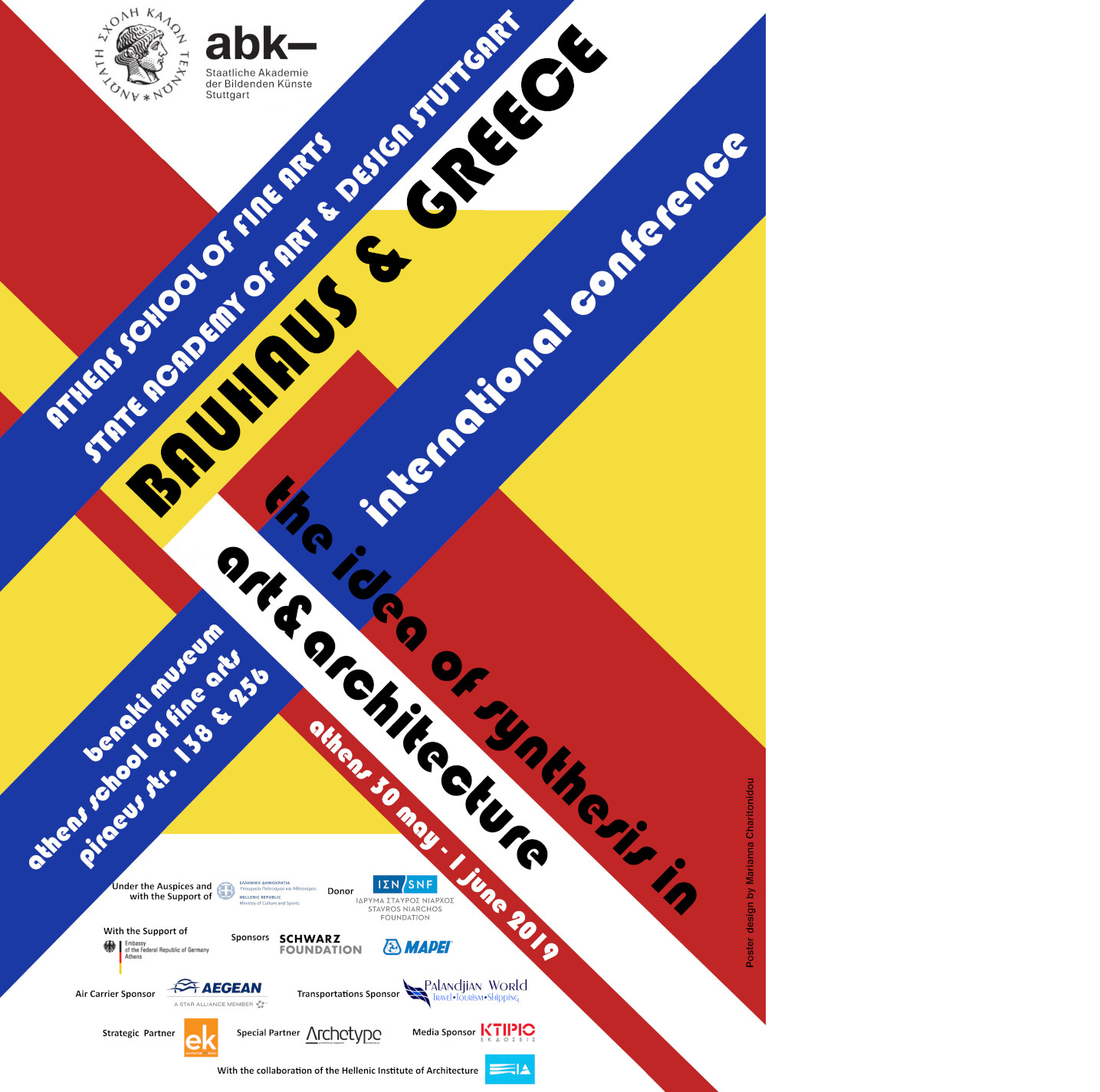On the 100th anniversary of the founding of the Bauhaus in Weimar, The Athens School of Fine Arts and the State Academy of Art and Design Stuttgart are organising an international congress entitled Bauhaus and Greece: The New Idea of Synthesis in Art and Architecture. The congress will be held at the Benaki Museum and the Athens School of Fine Arts on 30 May – 1 June 2019.
The 100th anniversary of the Bauhaus, this important event for the arts, architecture and art education, provides the setting for numerous festive events worldwide.
The Bauhaus was founded in 1919 on the ruins of the First World War and under the dramatic circumstances of the Weimar Republic, which, like the Bauhaus, remained alive until the Nazi dictatorship in 1933. The Bauhaus is therefore a unique, non-repeatable educational and cultural experience of the European interwar period.
In the 14 years of its eventful history, the school contributed decisively to the shaping of artistic and aesthetic orientations in the 20th century and, as a “classical” variant of our modern tradition, forms a fundamental point of reference up to the present day. However, the Bauhaus was not only a laboratory of industrial design and production and the development of a “machine style”, but also formed the framework for multiple ideological approaches and political orientations with a view to creating a new social unity that would result in a new humanism.
The Bauhaus was not one, but many, hence its aftermath as a point of reference and source of study and inspiration. This is the main motive of the Athens Conference. Two topics will be dealt with in the three days of the meeting: The first topic is the Bauhaus reception in Greece and other countries before and after the Second World War. In the special case of Greece, the influences of modern European culture on the arts, architecture and art education during these periods will be discussed. The second topic is about other international initiatives that directly or indirectly referred to the Bauhaus or even aimed at its re-founding, such as the project of Mendelsohn, Wijdeveld and Ozenfant to create a Mediterranean Academy, the Black Mountain College in North Carolina, the New Bauhaus in Chicago, the “White City” of Tel Aviv, the Hochschule für Gestaltung in Ulm and others.
About 65 congress participants from Greece and abroad will contribute to these topics. Invited guests from the fields of art and architectural history will address the character and significance of lesser-known aspects of Bauhaus history.
In August 1923, on the occasion of the first major Bauhaus exhibition in Weimar, two concerts with works of modern “classical” music by avantgarde composers of the time such as Ernst Krenek, Paul Hindemith, Ferruccio Busoni and Igor Stravinsky took place. It was, so to speak, a musical counterpart of the Bauhaus, on the basis of a musical paradigm that would later be branded as “degenerate”. These concerts will now be performed again in the Benaki Museum in the evening, in conclusion of each congress day. The last evening will be dedicated to the jazz music of that time, which was known to be one of the musical preferences at the Bauhaus. The artistic director of the Athens Bauhaus evenings is conductor George Petrou. The concerts are organized under the support of the Embassy of the Federal Republic of Germany in Athens and Schwarz Foundation.
The “Greek contribution” to the Athens Congress will be rounded off with a new edition of the most important interwar publication on modern Greek architecture. It is the now legendary, extremely rare volume New School Buildings, a documentation of the structures widely known as “Papandreou´s Schools” of the second Venizelos government period (1928-1932), which Patroklos Karantinos edited in 1938. Spread across the country, these schools, where several generations of pupils were educated, are the clearest and most revealing testimony to the desire for modernisation and the intensity with which the messages of modern European architectural culture were incorporated into Greece in the 1930s. The book is published by Kapon Editions, thanks to an exclusive grant by the Stavros Niarchos Foundation.
A three-day intensive, multi-faceted festival programme with scholarly, editorial and artistic aspects is expected, a contribution to the outstanding importance of the event.
To know more, please visit: website
Find out more at the PDF





